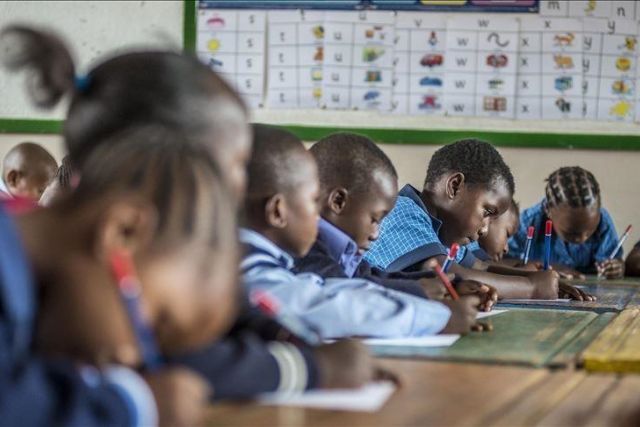Tanzania’s deaf students face learning crisis with too few specialist teachers
Campaigners say children with impaired hearing hardly go to secondary school at all and face high hurdles when they do

DAR ES SALAAM, Tanzania
Deaf rights campaigners in Tanzania are pressing the government to set up grants to train specialist teachers for deaf children, a group now in short supply.
As nations worldwide mark World Deaf week, thousands of deaf children in Tanzania are facing learning barriers due to a shortage of teachers as well as social stigma.
The growing crisis highlights a defective education system that fails to suit the growing needs of specialist teachers when schools badly need them, observers said.
Judith Kashuliza, a deaf rights campaigner, said most deaf students do not move forward in school due to a shortage of specialist secondary school and teachers.
“We need more schools and teachers who understand sign language,” Kashuliza told Anadolu Agency.
There were 91,000 deaf students in Tanzania in 2009, but only seven schools were fully equipped to provide specialized education at the time.
Kashuliza said those past school age are left without the means to acquire basic literacy and numeracy skills.
Kashuliza called on the government to invest in specialized education for the deaf to reduce illiteracy among students with special needs.
Although children in Tanzania are entitled to better education, deaf children face multiple barriers to attaining basic literacy and numeracy skills due to poor learning environments that affect their academic performances.
While education is key to passing knowledge on to children, skills values and attitudes are needed for them to be responsible citizens, and negative attitudes towards deaf children affect them psychologically.
“These children, who are too often neglected, surprisingly have extraordinary talents that need to be developed,” said Sarah Kisanga, an educational psychologist at the University of Dar es Salaam in the capital.
There are over half a million deaf and hard-of-hearing people in Tanzania, or 1.2 % of the country's population. Out of those, 55% are illiterate with no grasp of either English or Swahili, official statistics show.
Among deaf children, many attend only primary schools but then drop out due to lack of sign language interpreters.
Cognitive problems
According to the World Health Organization (WHO), hearing loss in children affects not just academic outcomes, but communication, cognition behavior, and emotional behavior.
At the Dodoma School for the deaf in the capital, students are learning academic subjects and are also trained in vocational skills such as tailoring, gardening, poultry, and handicraft.
“We want all students to understand lessons when in class, that's why our teachers know basic sign language skills,” said Kennedy Maingu, a teacher.
Maingu said preparing deaf students for school must start early for building the foundation of communication by sign language.
“I have seen many deaf children starting primary school without the ability to communicate and with no grasp of language,” he said.
The school is working to help deaf children learn to communicate, build confidence, and develop basic literacy and numeracy skills.
“Deafness isn't a learning disability, as with the right support deaf students can perform well,” he said.
Karim Sajuki, 15, a resident of Tandika, has been deaf since birth. With that also comes muteness, so his hands becomes his tongue and his eyes his ears. Sajuki attended a local school for the deaf in Dar es Salaam and last year graduated seventh grade.
Grasping lessons
However, practically that did not help.
“It was hard for me to grasp lessons because my teachers didn't use sign language,” Sajuki told Anadolu Agency through a sign language interpreter.
Similarly, Ummy Khalfan, 16, says her parents decided to put her in school for the hearing impaired, hoping it would have the infrastructure to teach her but were disappointed.
“I hardly understood anything, I was forcing myself to read lips and speak, every day was a struggle,” she said.
Campaigners say sign language should be adopted as an optional language in schools curriculum and be recognized as an official language.
“Most of the teachers don't know sign language, and the deaf can't understand what they teach,” said Kashuliza.
At Uhuru Mchanganyiko Primary School, two part-time sign language interpreters dart between classes trying to cater to a dozen students who are deaf or hard of hearing.
The school, located at a busy city intersection, is one of the few places in Tanzania where students with impaired hearing can learn through a sign language interpreter.
“It is a hard job, but we do it to help these children,” said Ladislaus Nganga, a sign language interpreter.





